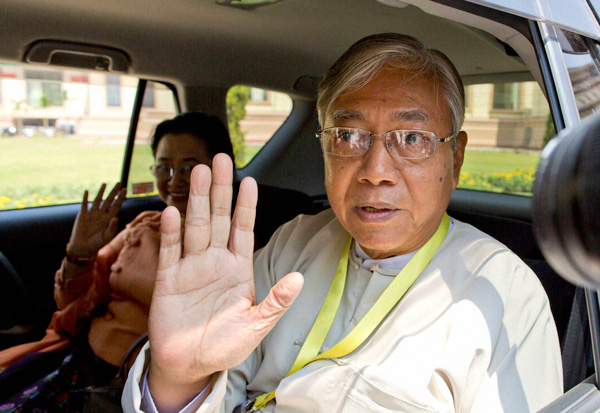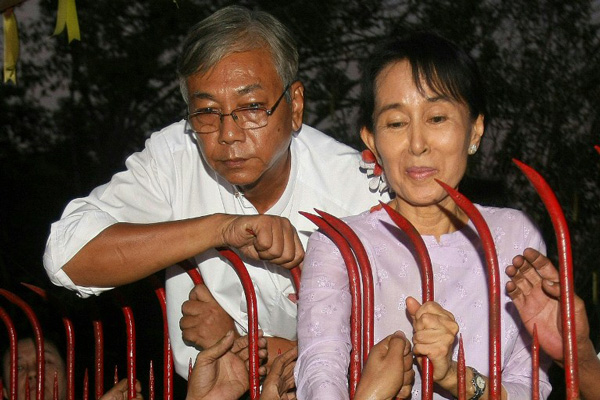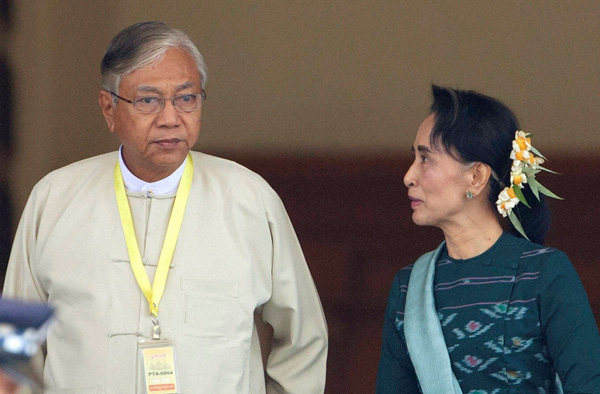Meet Htin Kyaw, Myanmar's first civilian president

The new president
- U Htin Kyaw is the next President of Myanmar
- He won 360 of 652 seats in both houses
- Htin Kyaw is said to be Aun San Suu Kyi\'s advisor and good friend
Challenges ahead
- Military still controls many parts of Myanmar including all civil services, substantial businesses
- Ethnic tensions and fighting continue despite a ceasefire. New ethnic mergers and contentions with the ruling NLD need to be sorted.
- The NLD needs to groom leaders apart from those close to Suu Kyi
More in the story
- Who is Htin Kyaw?
- How does Myanmar presidential elections work?
In a stunning victory, U Htin Kyaw (pronounced: thin chaw) has been elected as the first civilian president of Myanmar. He won 360 seats out of the 652 votes case by both houses of Parliament. This gives the Aun San Suu Kyi led National League for Democracy victory over the military and the USDP in Myanmar.

Photo: AP/ PTI
The new vice presidents (Myanmar has two) - Henry Ven Theo, also an NLD nominee, won 79 votes, following the Army's nominee Myint Swe, who predictably won all of the Army's 216 votes.
How do Myanmar presidential elections work?
In the Hluttaw (parliament), the Upper house and Lower house nominates a member each from the ruling party (NLD) and opposition party(USDP) and votes one candidate from each house. With the sheer number of NLD seats, their own candidates were bound to win these elections.
Read: Dawn of a new hope in Myanmar? Suu Kyi still has to walk a tightrope
The military with its 25% quota also nominates 1 candidate.
The candidates for these elections were as follows:
Lower house:
Htin Kyaw (NLD)
Aung Khin Myint (USDP)
Upper house:
Henry Ven Theo (NLD)
Sai Mauk Kham (USDP)
The military's man is Lieutenant General Myint Swe.
A friendship that made the president
The Yangon Taxi Drivers association contains some of the most vocal and vibrant supporters of the Aun San Suu Kyi led National League for Democracy (NLD). Not because the President elect is Suu Kyi's 'driver', as the media has bizarrely reported. But because "Daw Suu and Htin Kyaw are best friends!" , says my taxi driver.
At least that has been the popular representation of Myanmar's next leader so far.

Photo: Soe Than Win/ AFP Photo
Since the landmark victory of the NLD on 8 November 2015, speculation over who would take over has been a hot potato for anyone following Myanmar politics. It was widely expected that those with sterling NLD credentials and more importantly - the trust of Suu Kyi would be chosen.
Suu Kyi herself, has been barred from occupying the post because of an arbitrary law written into the Constitution by the army in 2008. This was directed indirectly but surely at her.
U Htin Kyaw has been elected the next President of Mynamar in a strong majority win
Article 59 (f) of the 2008 Constitution made it illegal to have next of kin holding another foreign passport. Her son's have British citizenship and the Constitution cannot be changed without the full support of the army; not something that is possible with the current 25% quota that the Tatmadaw still holds.
But now with Htin Kyaw's win, Suu Kyi has the means to be prominently engaged with governing Myanmar.
A new generation of Myanmar leaders
There were others on the list of possible NLD candidates, but Htin Kyaw best fit the bill. He is adequately popular, yet docile and conceding. He has visibly been by Suu Kyi's side since the 90s and advised her along the way. He is also veritably the least army-friendly person, unlike other NLD elders. More importantly, so far his vision for Myanmar matches Aun San Suu Kyi's.
Also read: Winning was easy. Suu Kyi's real test is making Myanmar truly democratic
There are those who have called him nothing but a puppet President. In Yangon, rumours vary. One foreign analyst working in Yangon thinks this was planned all the way to get the green signal for a quick constitutional amendment. He says "we leave it for the next 12 months where he talks over, then we see him fail because of the gargantuan expectations of the public, and that lays precedence for the Lady to take over formally."
But Suu Kyi still seems intent on maintaining the current Constitution, however distorted it may be. By rejecting hasty constitutional changes to accommodate herself into the presidency, the NLD is steadily establishing its vision to abide by the law of the land, engage with the military and lead the system towards gradual change. She has been honest about her working "above the President," so at least there are no surprises there.
Ever since the nominations were announced on 10 March, everyone that I have talked to in Yangon, especially from the NLD, have expressed the dream that Suu Kyi will someday be the 'rightful president".
An arbitrary law from 2008, prohibits Suu Kyi to become President because her next of kin have foreign passports
It is not hard to miss the overwhelming deification that Suu Kyi's family receives in the cities. The intense NLD campaigning in the countryside and a promise to work on the agricultural sector, has solidified support of her from the rural areas too.
The NLD Vice Presidential nominee on the other hand sort of "came out of nowhere," said one NLD worker in the capital. Henry Ven Theo, a Christian Chin ex-Army officer was reportedly very much surprised when he heard of the nominations.
Read: Aung San Suu Kyi nominates 'former driver' for Myanmar president's role
Born of farming parents from one of the poorest parts of the country in Chin state, he went on to study at Yangon and Mandalay University, worked in a Mandalay factory and then joined the Army.
His past reputation within the NLD itself is relatively unknown, but his nomination indicates a long promised move towards an ethnically diverse and inclusive party - with a Mon-Bamar President and Chin non-Bamar President.
The Army's tight grip prevails and ethnic areas are still volatile
A mere NLD presidency guarantees very little against the military that has carefully and categorically planned this transition phase since 2012.
Apart from the 2008 addition of a 25% in the Hluttaw that allows them to veto any constitutional reform, there are other things.
The entire Myanmar administrative system, home affairs and border defence is still technically under the command of the Army. Many would rather toe the line of the immediate bosses and secure their jobs rather than challenge the system.
Htin Kyaw's vision for Myanmar matches Aun San Suu Kyi's, and that has made all the difference
The Military has brought in FDI, relatively opened the press, encouraged cinema and invited massive amounts of tourism.
The military has also negotiated a rather underrepresented ceasefire agreement with eight of the largest armed ethnic organisations. But the ceasefire of 2015 was not signed by many of the groups in these areas and conflict continues.
The way forward
If the NLD wants to lead Myanmar successfully, they have to adopt several nuanced policies.

Photo: AP/ PTI
Firstly, the change they advocate has to be gradual and non-threatening to the Tatmadaw and the military infrastructure.
Secondly, a new generation of NLD leaders who are popular and responsible need to be groomed. The NLD is politically strong but the reliance on those close to Aung San Su Kyi to lead them, limits the growth of the party.
The military still has a hold in Myanmar and the NLD's challenge will be to work alongside that pressure
Thirdly, it's time to appreciate that everyone in the country has an investment in moving forward.
Though the Tatmadaw, the ethnic militias, the business sector, the NLD and others may not agree on Myanmar's future, as Moe Thuzar, an ASEAN lead researcher puts it, "none of them want to return to square one."
Edited by Anna Verghese
More in Catch:
Know thy enemy: Hafiz Saeed talks about himself and his exploits
With This Ring: the boxing film that took sweat, blood, tears, and 10 years
ED arrests Chhagan Bhujbal: first NCP bigshot to go to jail. Who's next?
India vs New Zealand: 5 Kiwi players who can spoil MS Dhoni's party
First published: 15 March 2016, 3:16 IST





![BJP's Kapil Mishra recreates Shankar Mahadevan’s ‘Breathless’ song to highlight Delhi pollution [WATCH] BJP's Kapil Mishra recreates Shankar Mahadevan’s ‘Breathless’ song to highlight Delhi pollution [WATCH]](https://images.catchnews.com/upload/2022/11/03/kapil-mishra_240884_300x172.png)

![Anupam Kher shares pictures of his toned body on 67th birthday [MUST SEE] Anupam Kher shares pictures of his toned body on 67th birthday [MUST SEE]](https://images.catchnews.com/upload/2022/03/07/Anupam_kher_231145_300x172.jpg)




_in_Assams_Dibrugarh_(Photo_257977_1600x1200.jpg)

